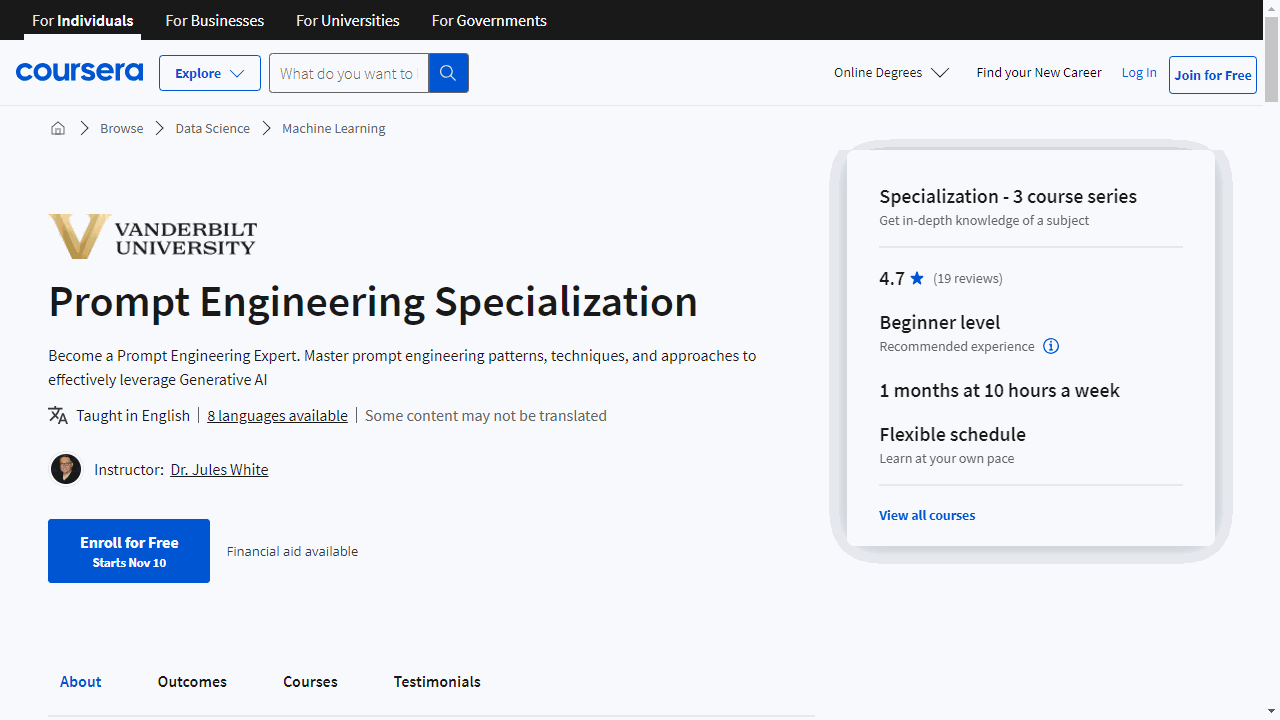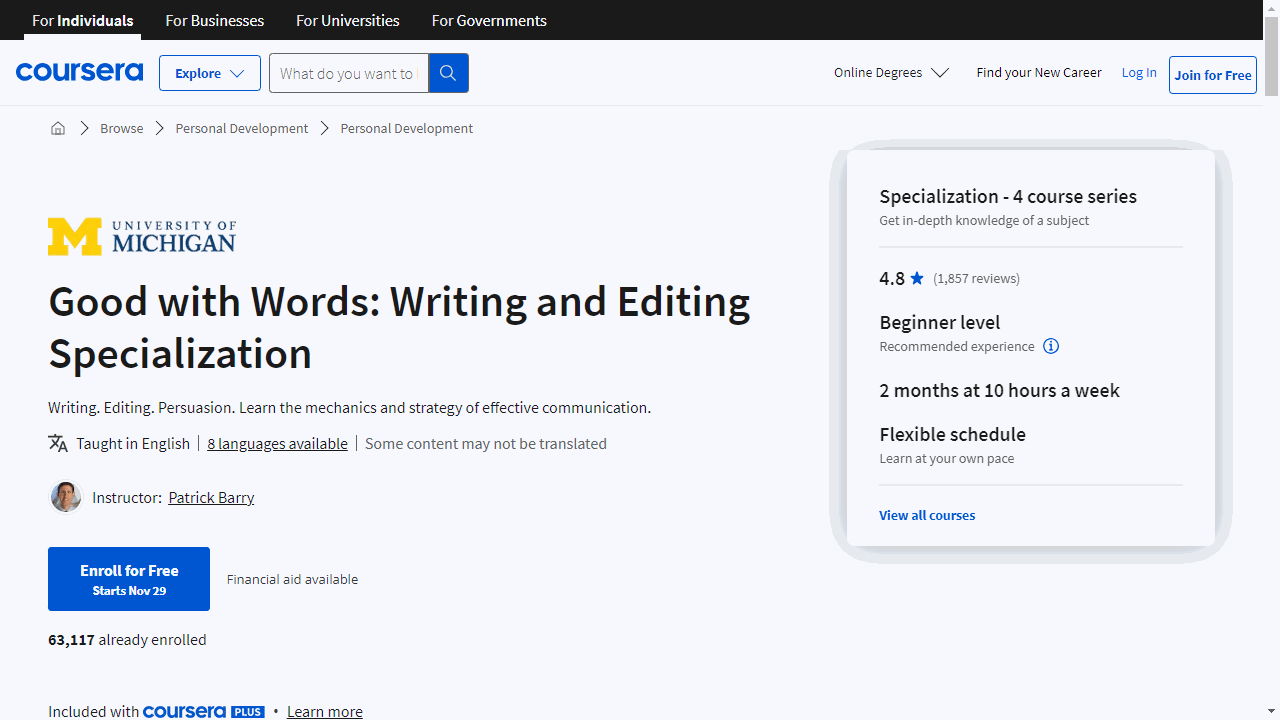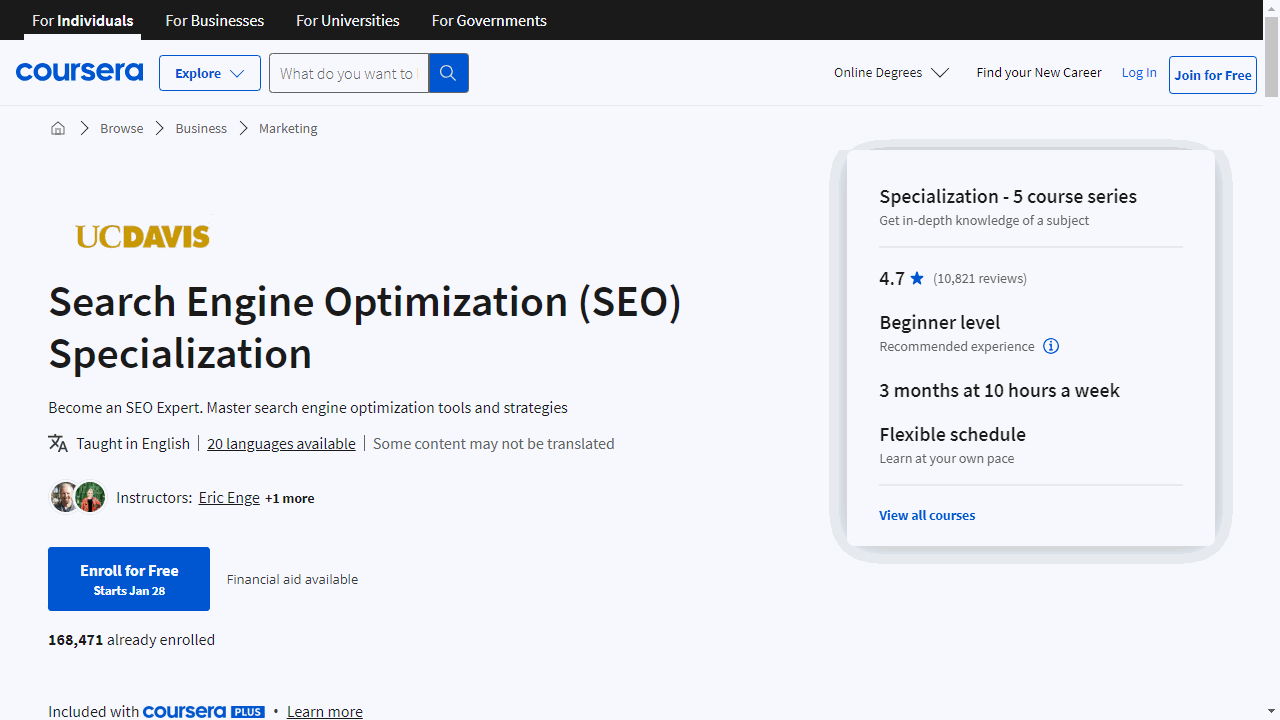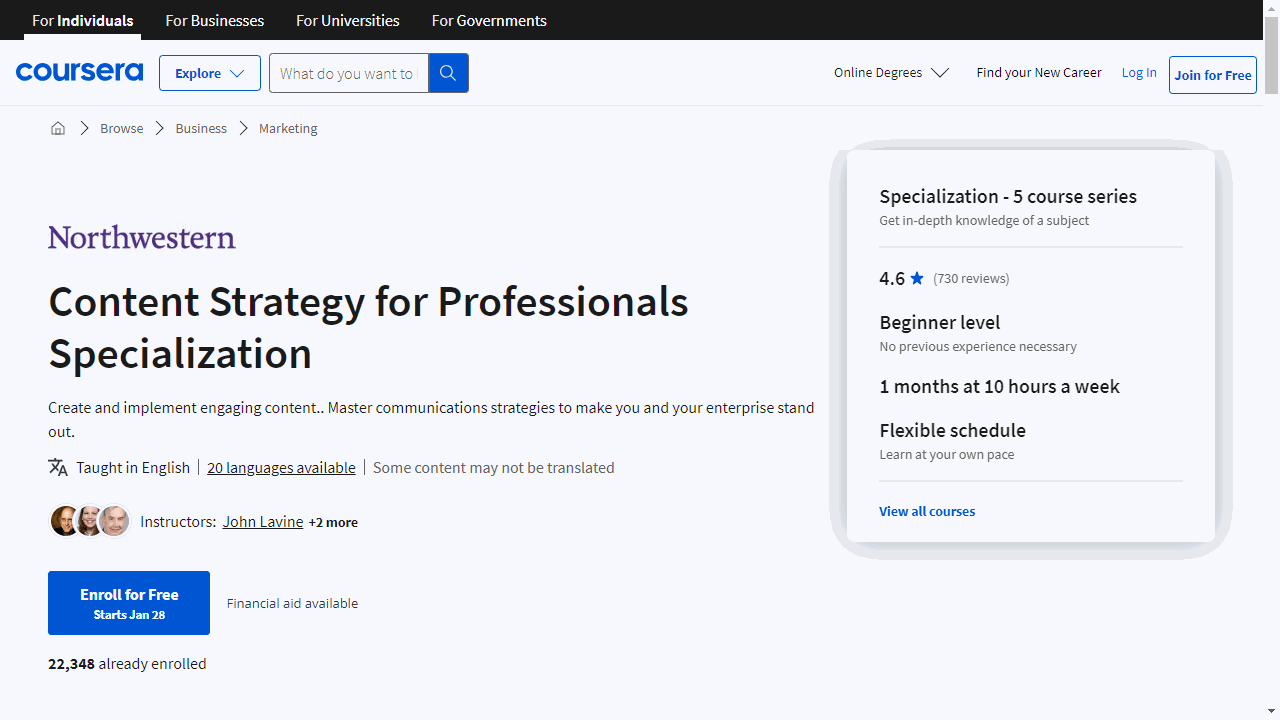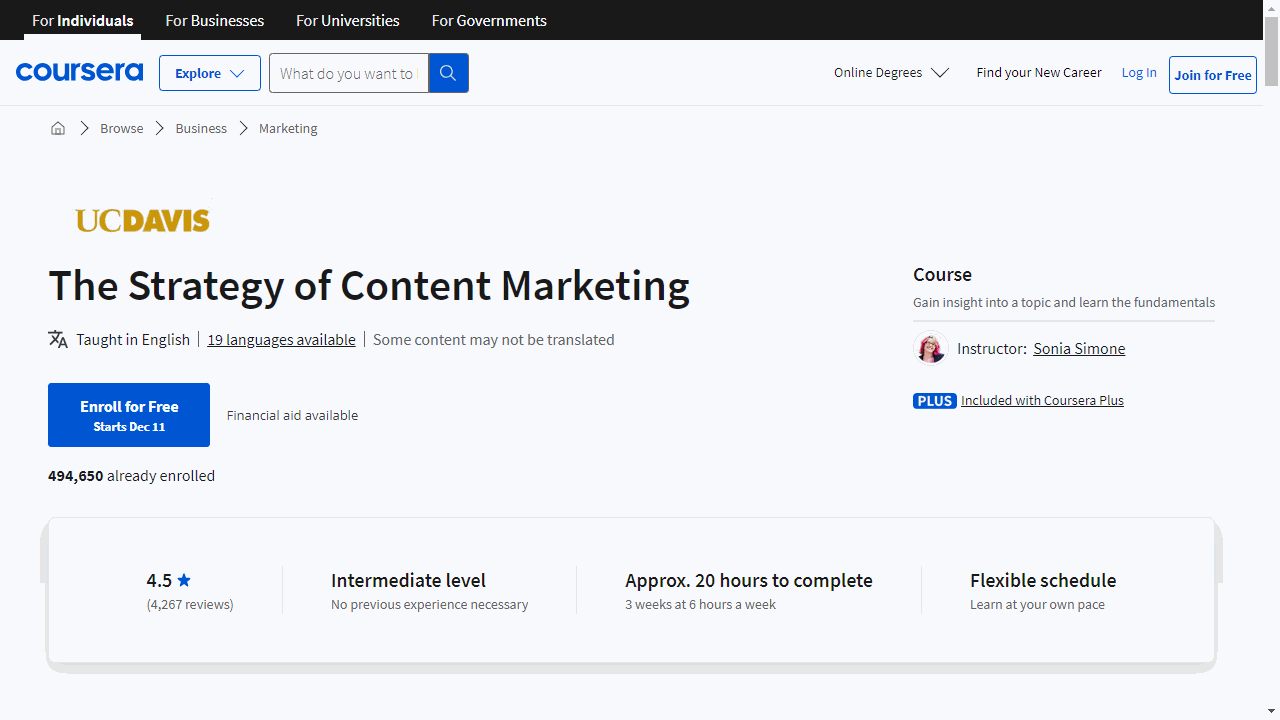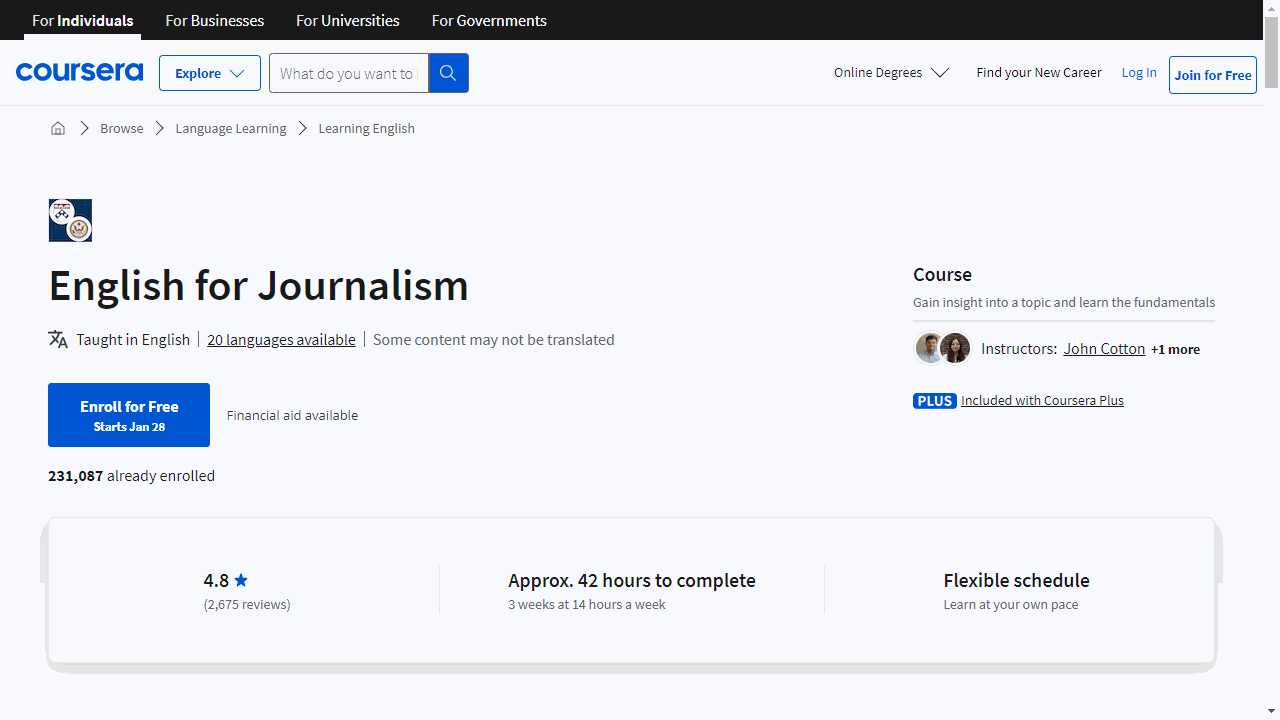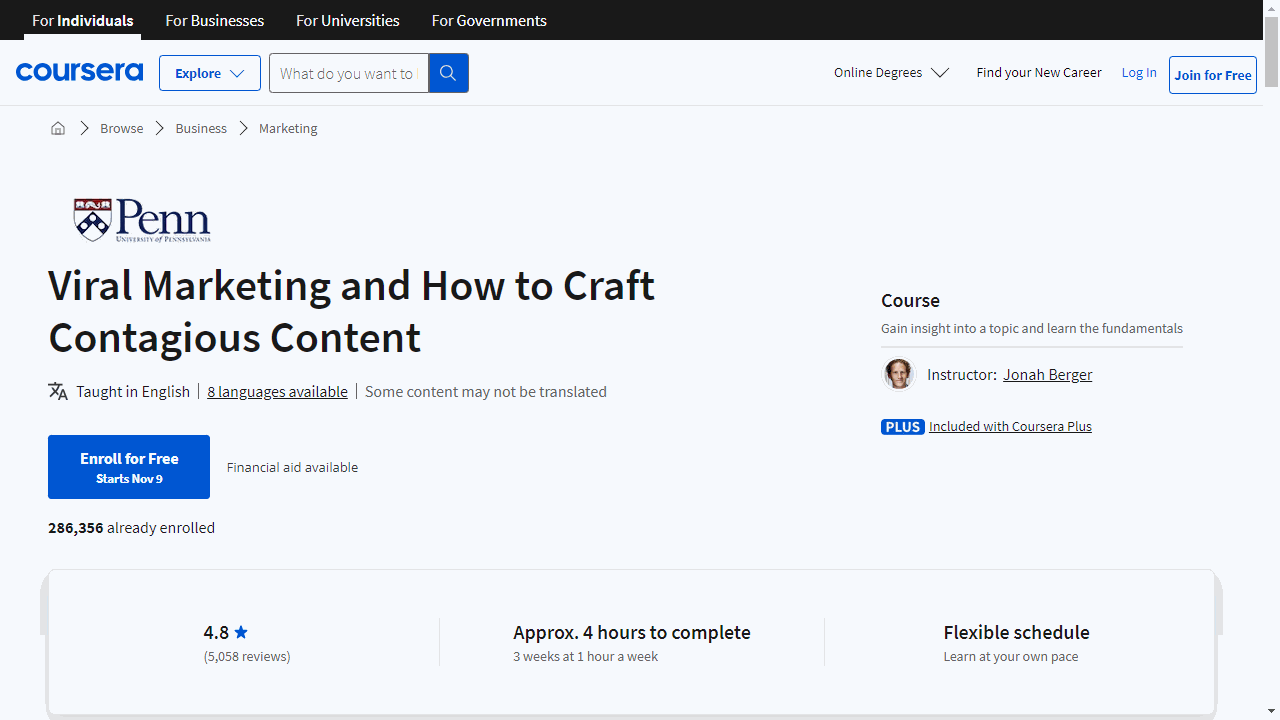Finding a good content writing course on Coursera can be a daunting task.
With so many options available, it’s easy to feel overwhelmed and unsure where to start.
You might be looking for a course that can help you improve your writing skills, learn how to create viral content, or gain a deeper understanding of content strategy.
We’ve done the research for you and have compiled a list of the 7 best content writing courses on Coursera.
For the best course overall, we recommend Prompt Engineering Specialization by Vanderbilt University.
This specialization equips you with the skills to harness the power of tools like ChatGPT effectively, enabling you to write better content, perform data analysis, and ensure AI outputs are trustworthy.
But if this isn’t quite right for you, we have plenty of other options.
Keep reading for more recommendations for beginners, intermediate learners, and experts, as well as courses focusing on specific content writing niches like SEO and social media.
Prompt Engineering Specialization
This series of courses, offered by Vanderbilt University, is designed to equip you with the skills to harness the power of tools like ChatGPT (OpenAI) effectively.
The course “Prompt Engineering for ChatGPT” is a comprehensive introduction to becoming a proficient user of generative AI.
You’ll learn to craft prompts that tap into the AI’s capabilities, enabling you to tackle a wide array of tasks more efficiently, from writing and summarization to complex problem-solving.
Moving on, “ChatGPT Advanced Data Analysis” is a practical course that teaches you to leverage AI for data science tasks without needing a background in programming.
You’ll discover how to transform raw data into compelling presentations, extract valuable insights from documents, and even automate routine content creation.
This course is about enhancing your ability to handle data with the help of AI, making your workflow more efficient.
Lastly, “Trustworthy Generative AI” addresses the critical aspect of reliability in AI outputs.
This course provides strategies for selecting suitable problems for AI, designing prompts that minimize risks, and verifying the information generated.
It’s about building a foundation of trust in the AI’s capabilities and integrating it into your creative and analytical processes.
The focus is on practical application, ensuring that what you learn will have real-world benefits.
Good with Words: Writing and Editing Specialization
Whether you’re writing for personal growth or professional advancement, this series from the University of Michigan will help you communicate with clarity and style.
The journey begins with “Writing and Editing: Word Choice and Word Order,” where you’ll learn to craft persuasive text through strategic syntax and sophisticated punctuation.
The course also provides ongoing access to extensive resources, including readings and digital libraries from the University of Michigan and the University of Chicago.
In “Writing and Editing: Structure and Organization,” you’ll refine your ability to structure information effectively.
The course challenges the “Show, don’t tell” mantra, teaching you when and how to use each technique to your advantage.
Time management strategies from the first course are expanded upon, ensuring your writing process is as efficient as it is effective.
“Writing and Editing: Drafting” tackles the common obstacle of starting to write.
With techniques like “freewriting” and “pre-mortems,” you’ll overcome the paralysis of perfectionism and begin producing drafts with confidence.
The course continues to support your development with a variety of writing examples and monthly curated content.
The final course, “Writing and Editing: Revising,” focuses on refining your drafts into polished pieces.
You’ll distinguish between editing and proofreading, learn to present data compellingly, and apply a systematic approach to feedback.
This course ensures your writing is not only clear but also impactful.
Search Engine Optimization (SEO) Specialization
Provider: University of California, Davis
This comprehensive program demystifies how search engines like Google rank content and teaches you to craft content that stands out.
The journey begins with “Introduction to Google SEO,” where you’ll grasp the basics of how Google operates and the evolving landscape of SEO.
This course sets the foundation, introducing you to SEO strategies and tactics to enhance website visibility and avoid Google penalties.
Moving forward, “Google SEO Fundamentals” deepens your understanding of search engine algorithms and effective SEO strategy creation.
It covers keyword selection, consumer psychology, and on-page SEO analysis, equipping you with the skills to make your content resonate with both search engines and readers.
In “Optimizing a Website for Google Search,” the focus shifts to practical application.
You’ll learn to conduct website audits, apply keyword research in content strategy, and optimize for local search.
This course is ideal for hands-on learners eager to see tangible improvements in website performance.
“Advanced Content and Social Tactics to Optimize SEO” explores the synergy between content marketing, social media, and SEO.
You’ll discover how to leverage these channels to boost your SEO rankings and use influencer marketing to increase your website’s authority.
The capstone project, “Google SEO Capstone Project,” challenges you to apply everything you’ve learned.
You’ll develop and execute a comprehensive SEO strategy for a chosen website, from keyword research to competitive analysis, culminating in a professional SEO client report.
Throughout this specialization, you’ll acquire key skills such as keyword research, content marketing, social media marketing, and more.
Content Strategy for Professionals Specialization
Provider: Northwestern University
This series not only sharpens your content creation skills but also teaches you how to strategically engage your audience.
“Content Strategy for Professionals: Engaging Audiences” is your starting point.
It equips you with the skills to grab and hold your audience’s attention through strategic storytelling and various engagement techniques.
Experts like Rachel Davis Mersey and Ed Malthouse guide you through creating conversations and content that enhance user experience.
This course is essential for making your content—and consequently, your organization—stand out.
In “Managing Content,” you delve into the management of your content across different platforms, focusing on human-centered design and the effective use of social and mobile media.
It includes a practical toolkit for immediate application in your workplace.
This course is perfect if you aim to manage engaging content that propels your enterprise forward.
“Expanding Your Content’s Reach” teaches you how to grow your audience and deepen your understanding of them using a mix of traditional and emerging tools and social networks.
It’s designed to amplify your content’s impact, helping you reach a broader, more engaged audience.
The fourth course, “Ensuring Your Content’s Impact,” focuses on visual communication, including effective font, photography, and video use.
It also covers content measurement to maximize impact.
With practical skills and a downloadable toolkit, this course prepares you to make informed, strategic decisions about your content.
The “Capstone Project” is where you apply all you’ve learned by developing a Content Strategy package for a fictional startup, mirroring real-world tasks.
This project solidifies your understanding and showcases your ability to create impactful content strategies.
By completing this specialization, you’ll gain expertise in content creation, brand management, and content marketing.
The Strategy of Content Marketing
Provider: University of California, Davis
This course equips you to create impactful content, grow your audience, and enhance your business.
You’ll start by understanding the core purpose of content and how to structure it effectively.
With guidance from Stefanie Flaxman, the Editor-in-Chief at Copyblogger, you’ll learn to manage a content calendar and discover strategies for maintaining an engaging website.
The course introduces the 7A Framework, focusing on agility, authenticity, attention, audience, authority, action, and affinity.
This framework is crucial for creating content that connects with your audience and prompts them to engage with your brand.
You’ll also master the art of writing powerful headlines and creating an “About Me” page that truly represents you.
The course simplifies complex concepts like empathy maps and experience maps, making them accessible and actionable.
Content types such as attraction, affinity, action, and authority are covered in detail, teaching you how to establish your authority and engage your audience effectively.
Beyond content creation, the course covers promotion strategies, email marketing, and converting traffic into revenue through well-crafted landing pages.
It also addresses the importance of ethics, plagiarism avoidance, and copyright law, ensuring you create content responsibly.
Metrics are demystified, helping you understand which data points are crucial for tracking your success and areas for improvement.
In essence, “The Strategy of Content Marketing” from UC Davis is a comprehensive course that provides practical, real-world strategies for anyone looking to excel in social media marketing.
English for Journalism
Provider: University of Pennsylvania
This course offers a unique blend of journalism’s rich history, ethical considerations, and practical writing techniques, making it an ideal choice for aspiring journalists or anyone looking to sharpen their writing skills.
The journey begins with an exploration of journalism’s evolution from its early days before 1690 to the modern era.
This historical context not only highlights the significance of journalism in society but also sets the stage for the rest of the course.
As you progress, the course introduces key language concepts essential for journalism, including tense usage, word families, and effective communication strategies.
Interactive elements like games and levels ensure these concepts stick, making the learning process both effective and enjoyable.
Practical skills form the core of the course.
You’ll learn how to gather sources, craft compelling stories, and make an impact through your writing.
The course covers various mediums, from newspapers and magazines to radio, and even includes a video interview with a student journalist from The Daily Pennsylvanian, offering insights into real-world journalism.
Broadcast journalism also gets its spotlight, teaching you how to engage audiences through conversational styles and understand the dynamics of TV news ratings.
The digital age’s influence on journalism is thoroughly examined, addressing the digital divide, the ethics of online reporting, and the emergence of citizen journalism.
Hands-on assessments throughout the course, such as creating story pitches, writing articles, and developing follow-up questions, are designed to build your confidence and hone your skills.
These practical exercises are complemented by supplemental readings and listenings on topics like media freedom and the challenges of digital journalism, providing a well-rounded understanding of the field’s current landscape.
Viral Marketing and How to Craft Contagious Content
Provider: Wharton, University of Pennsylvania
This course isn’t just about creating buzz; it’s about understanding the mechanics of what makes content spread.
The course begins with a solid foundation, exploring the principles outlined in the book “Contagious: How Things Catch On,” a bestseller by the course’s instructor, Jonah Berger.
You’ll delve into the psychology behind viral trends, equipping you with knowledge that goes beyond the surface level.
As you progress, the course breaks down the essentials of memorable messaging.
You’ll learn to distill complex ideas into simple, impactful messages. Discover how to grab attention with the unexpected, make your message tangible, and establish trust through credibility.
But it doesn’t stop there; you’ll also learn to weave in emotional elements and craft narratives that resonate with audiences.
Understanding the role of social influence is crucial, and this course covers it thoroughly.
You’ll examine how social norms can be leveraged to promote your content and when standing out rather than blending in can be more effective.
Word of mouth is a powerful tool, and you’ll learn to harness it by providing your audience with social currency.
The course teaches you to create triggers that keep your content top of mind, use emotions to boost sharing, and ensure your content is seen and remembered.
The intricacies of social networks are also a focal point.
You’ll gain insights into how information spreads through networks and the strategic approaches—like sprinkler and waterfall strategies—that can help you reach your audience more effectively.
Understanding the importance of social ties and what motivates people to share content is key to this section.
At the end, you’ll have a comprehensive understanding of viral marketing.
This isn’t just a series of lectures; it’s an interactive experience designed to equip you with practical skills that you can apply to your marketing efforts.
If you’re ready to dive into the world of viral marketing and create content that makes a lasting impact, this course offers a clear and structured path to get you there.
